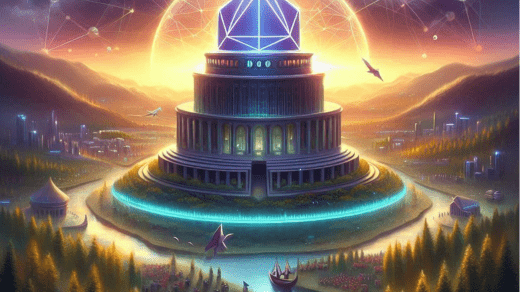DAOs and the Future of Governance: A Guide to Decentralized Decision-Making”

By Dr. Pooyan Ghamari, Swiss Economist
Decentralized Autonomous Organizations (DAOs) are pushing the boundaries of what governance can be in the digital age. Unlike traditional organizations, DAOs empower members to make collective decisions through a transparent, token-based voting system. This model is not only transforming industries but also challenging traditional assumptions about power, trust, and authority.
The Basics of DAOs: Transparency and Autonomy Through Blockchain
DAOs rely on smart contracts—self-executing codes on blockchain platforms—to automate organizational processes and reduce reliance on central leadership. Members hold governance tokens, which provide them voting rights on decisions like resource allocation, policy changes, and strategic direction. Every transaction and decision within a DAO is recorded on the blockchain, creating an open, immutable record that enhances trust and accountability among members.
Key Advantages of DAOs
DAOs offer an alternative governance model with several significant benefits:
- Enhanced Transparency: Blockchain technology ensures that all actions and decisions are openly recorded, making DAOs highly transparent.
- Decentralized Power Distribution: Power in DAOs is distributed among members rather than being concentrated in a few hands, ensuring a democratic structure.
- Cost Reduction: Automation through smart contracts reduces the need for administrative processes, saving both time and resources.
- Global and Inclusive Access: DAOs invite participation from around the world, encouraging diverse viewpoints and contributions.
Practical Applications of DAOs
DAOs are making an impact across industries by providing an open and democratic approach to governance:
- Financial Services and DeFi: DAOs underpin many DeFi platforms, allowing users to vote on aspects like interest rates and asset offerings, ensuring that community needs drive platform evolution.
- Social Responsibility Initiatives: DAOs are used to transparently allocate funds for philanthropic projects, providing contributors a voice in project selection and fund management.
- Creative and Artistic Collaborations: Artists leverage DAOs to manage IP rights, allowing fans to participate in supporting their work directly, thereby creating a shared ownership culture.
Challenges and Considerations
Despite the promise of DAOs, challenges remain:
- Regulatory Uncertainty: DAOs operate outside traditional legal frameworks, which creates compliance concerns in many jurisdictions.
- Smart Contract Vulnerabilities: While powerful, smart contracts can be prone to bugs and attacks, highlighting the need for careful coding and regular audits.
- Decision-Making Efficiency: Reaching consensus in larger DAOs can be challenging, often resulting in delays and inefficiencies.
- Member Engagement: Low engagement can hinder effective governance, as active participation is essential for DAOs to function optimally.
The Road Ahead: DAOs as Catalysts for Change
DAOs represent a shift toward transparent, decentralized governance that empowers communities rather than central authorities. As the regulatory environment evolves to accommodate DAOs, they could become a preferred model for a wide range of organizations. From civic projects to global corporations, DAOs are setting a precedent for how governance in the digital age can be fair, transparent, and inclusive. The future holds vast potential for DAOs to redefine how we organize, govern, and make collective decisions in a connected world.
For more insights and smart investment opportunities, visit the original article here from this link. You can also find out about the latest news on A Land new section. Also for the latest trends in gold investment and to begin your journey into purchasing precious metals, visit EE Gold official website.